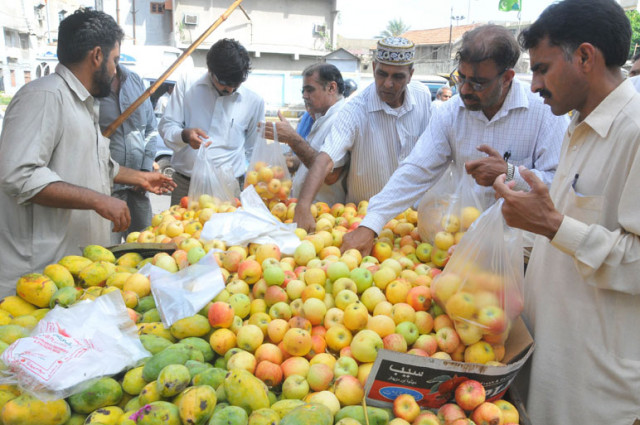Encouraging organic farming of fruits
Given environmental and health benefits, Pakistan must adopt this trend.

Given environmental and health benefits, Pakistan must adopt this trend. PHOTO: MOHAMMAD AZEEM/EXPRESS
Food is mostly still produced and handled in the traditional ways in Pakistan. However, with advancement in technology and changes in consumer preferences, the trend for production and consumption of safe and nutritious food is increasing.
Organic farming is a sustainable farming system that produces healthy crops and livestock without damaging the environment. It avoids the use of artificial chemical fertilisers and pesticides, relying on developing a healthy and fertile soil that can grow a mixture of crops.
There is nothing radically new about organic farming: it is merely our traditional method of farming with cow-dung as manure and neem leaves to keep insects away. Some other techniques of organic farming control pests by using farmer-friendly insects. Trychograma – commonly known as stingless wasps – are used to destroy American bollworm maggots and other worms. Chrysoperla – or green lacewings – eats the larvae of aphids.
Fruits are valued as a rich source of vitamins and minerals. Among fruits, citrus, mango, apple, guava, banana, dates, and melons are the leading fruit crops in Pakistan, according to the government, if we consider the area under cultivation and production. In Pakistan, the production of organic fruits is in its initial stages. Consumers are willing to consume organic fruits, but they have limited knowledge and opportunities to purchase them. At this stage, it is necessary to explore the marketing potential of organic fruits so that appropriate policy measures may be taken for further expansion and adoption. The more aware the consumer will be of health benefits associated with organic produce, the more likely they will be to purchase organic products.
A marketing cooperative needs to be established solely for the marketing of organic fruits, to save farmers from exploitation by pre-harvest contractors. The government should give proper attention to providing organic pesticides to farmers at reasonable prices by establishing dedicated centres in various districts. Some traders believe that there is good potential for organic fruits, and that their demand will grow as more consumers become acquainted of their health and environmental benefits. Nevertheless, if more trade is carried out in processed products like jam, jellies, juices and nectars, fruit pastes and canned fruits in syrup, there is no reason why organic fruit farming can make a big name for Pakistan in markets abroad.
THE WRITERS ARE RESEARCH OFFICERS AT THE INSTITUTE OF BUSINESS MANAGEMENT SCIENCES, UNIVERSITY OF AGRICULTURE, FAISALABAD
Published in The Express Tribune, January 28th, 2013.
Like Business on Facebook to stay informed and join in the conversation.



















COMMENTS
Comments are moderated and generally will be posted if they are on-topic and not abusive.
For more information, please see our Comments FAQ